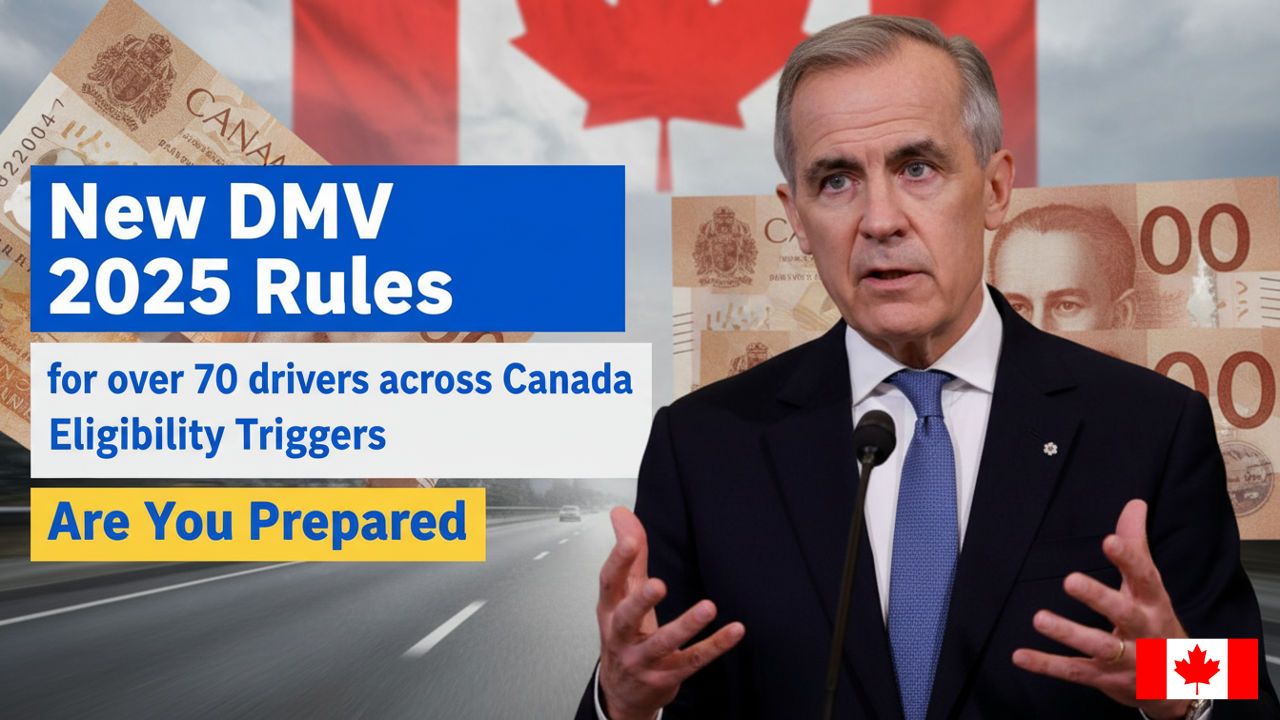Beginning in 2025, Canadian jurisdictions are rolling out enhanced licence renewal requirements for drivers aged 70 and above. These changes focus on ensuring vision, medical fitness, and cognition are assessed before renewal, while expanding online renewal options and digital verification tools. This guide presents a research-based, clear explanation of what’s changing, why it matters, how it will affect you if you are a senior driver, and practical steps to be fully prepared.
New DMV 2025 Rules for Over-70 Drivers Across Canada Quick Summary
Item |
Details |
|---|---|
Affected age group |
Primarily drivers aged 70+ in most provinces |
Key new requirements |
Mandatory vision tests, medical evaluations, cognitive screenings, and more frequent renewals |
Digital features |
Online booking, document upload, integrated health/DMV portals |
Implementation period |
Many changes begin in 2025 with phased rollout by province |
Purpose |
Enhancement of road safety while preserving senior driver mobility |
What to do now |
Book vision and health checks early, familiarise with renewal portal, update contact and licence details |
Official site link example |
https://www.ontario.ca/ (see provincial DMV/transportation website) |
What is Changing for Senior Drivers in Canada
Driver licensing is handled at the provincial and territorial level in Canada. In 2025, many jurisdictions will adopt more rigorous renewal rules for older drivers, especially those aged 70 and above. These changes are designed to identify age-related medical, vision and cognitive issues early, rather than relying solely on driving history. In practice, key shifts include:
- Vision tests become mandatory more frequently for 70+ drivers, including checks of acuity, peripheral vision and contrast sensitivity.
- Medical and cognitive assessments are required where indicated (for example if a driver record shows concerns, or the applicant has health conditions).
- More frequent renewal intervals may apply; some provinces move from five-year cycles to two-year for older age brackets.
- Digital renewal workflows allow online booking, document upload and integrated systems between DMV and health providers.
- Conditional licences or additional testing such as road tests may be triggered if assessments flag problems.
These reforms aim to balance senior mobility with road safety. They do not automatically revoke licences at a certain age but instead rely on evidence of fitness.
Age Triggers, Medical and Vision Test Requirements
Below is an overview of typical triggers and requirements across provinces (actual rules vary by jurisdiction).
Trigger Age |
Common Requirement |
Notes |
|---|---|---|
70+ years |
Vision test every renewal |
Many provinces require vision screening for renewal once over 70. |
75+ years |
Medical certificate or physician report before renewal |
Often required in cases of known health conditions or flagged driving history. |
80+ years |
Renewal every two years with cognitive screening or road test if needed |
More rigorous assessment at higher ages or when medical concerns exist. |
For example, in one province, drivers aged 80 and over must renew their G class licence every two years, complete a vision test and a five-minute cognitive exercise. Similar age-based medical screening applies in other provinces such as British Columbia, Alberta and Newfoundland & Labrador. The goal is early detection, not age discrimination.
Online Renewal And Digital Process Enhancements
To modernise licence renewals and reduce visits to licensing centres, many provinces are introducing digital tools from 2025. Senior drivers may now:
- Book renewal or assessment appointments online via provincial transport portals.
- Upload or link medical/vision reports digitally, reducing in-person paperwork.
- Receive automated notifications about upcoming renewal deadlines, required tests or document uploads.
- Complete basic renewal steps online, though in-person visits may still be needed for tests or verification.
This digital shift seeks to make senior licence renewal smoother, while maintaining safety checks.
How Senior Drivers Should Prepare for 2025 Changes
To ensure a smooth renewal and avoid license issues, senior drivers are advised to take the following steps now:
- Schedule an eye examination with an optometrist or ophthalmologist and request a full report including peripheral vision and contrast tests.
- Book a medical check-up with your physician, telling them you intend to renew your licence and want to ensure your medical fitness to drive.
- Review your driving history for any flagged incidents, demerits or at-fault collisions—these may trigger additional assessments.
- Familiarise yourself with the renewal workflow for your province, including online portals, document upload requirements and booking processes.
- Update banking, address and contact details with your provincial DMV so you receive renewal notifications.
- Consider refresher driving courses or senior safe driving programs, as staying current may help preparedness and confidence.
- Plan for potential restrictions by exploring alternate transport options in case conditional licensing or additional testing is required.
Being proactive increases your chances of a seamless renewal and ongoing safe driving ability.
How These Changes Impact Mobility And Independence
While safety is the stated goal, there are implications senior drivers should consider:
- More frequent renewals may mean more administrative work and potential cost if additional tests are required.
- Conditional licences may limit driving to daylight hours, certain roads, or require a road test if flagged.
- Potential cost of medical/vision tests may fall on the driver depending on provincial funding.
- Digital access is essential; if you are not comfortable with online tools, seek assistance or support.
- Alternate transport planning is wise in case you are asked to take a restricted licence or pause driving.
Ultimately these changes aim to maintain mobility for safe drivers while reducing risk for all road users.
Practical Checklist Before Renewal
- Have your valid driver licence number and expiry date handy.
- Book your vision and medical assessments 6-8 weeks before licence expiry.
- Confirm with your provincial DMV if you need to attend an in-person centre or if online renewal is available.
- Gather required documents: old licence, proof of identity, medical/vision reports, any directive letters.
- If road test might be required, schedule in advance and get practice if needed.
- Maintain records of assessments and test results in case follow-up is necessary.
Frequently Asked Questions
1. At what age do these new rules apply for senior drivers?
The rules generally affect drivers aged 70 and above, with more frequent and detailed assessments for those aged 75, 80 and over depending on the province.
2. Do I automatically lose my licence when I reach a certain age?
No. Drivers are not revoked simply because of age. Rather, renewal processes may become more stringent, requiring vision tests, medical checks or additional assessment. Good fitness means you retain your licence.
3. Can I renew my licence online under the new rules?
In many provinces yes. Basic renewal steps, bookings and document uploads are available online. In-person steps may still be required for vision or medical tests.
4. What happens if I fail a medical or vision assessment?
If you fail an assessment, the licensing authority may require further tests, impose a conditional licence (e.g., daylight only), or refer you for a road test. The goal is safe driving, not immediate licence removal.
5. Do these rules apply equally in all Canadian provinces?
No. Each province sets its own rules, though there is growing coordination. The age triggers and assessment details vary. Always check with your local licensing authority for exact requirements.
Conclusion
The 2025 renewal rule updates for older drivers in Canada reflect the need to combine mobility with safety. If you are aged 70 or over, taking early action by booking vision and medical checks, updating your information and understanding your province process will put you in the best position to continue driving with confidence. By preparing now, you can ensure the changes enhance your road safety without jeopardising the freedom driving provides.
For More Information Click Here







